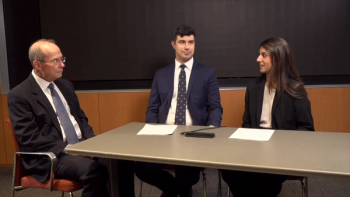
NMA 2024: Fasika Woreta, MD, discusses the Roman-Barnes Distinguished Lecture and new INTREPID program
Outgoing National Medical Association ophthalmology section chair Fasika Woreta, MD, discussed the Roman-Barnes Distinguished Lecture ahead of the NMA meeting.
The National Medical Association (NMA) holds its Annual Convention and Scientific Assembly in New York City this weekend. The Eye Care Network spoke with Fasika Woreta, MD, who is the outgoing chair of the NMA Ophthalmology section. Dr. Woreta is the Eugene de Juan, M.D. Professor of Ophthalmic Education at Wilmer Eye Institute’s Baltimore and Columbia locations. She currently serves as the director of the Eye Trauma Center and the director of the Ophthalmology Residency Program at the Wilmer Eye Institute in Baltimore, Maryland.
In this video, Dr. Woreta previews the Roman-Barnes Distinguished Lecture, discusses a new mentorship program for ophthalmic faculty, and lists the can't-miss lectures from this year's meeting.
Editor's note: The below transcript has been lightly edited for clarity.
Hattie Hayes: Hi, my name is Hattie Hayes and I'm the editor of Ophthalmology Times Europe. August kicks off with the National Medical Association holding its annual convention and scientific meeting in New York City. Joining me today, I have Dr. Fasika Woreta. We're going to talk about her presence at the meeting and what we can look forward to there. Thank you so much for joining me today.
Fasika Woreta, MD, MPH: Thank you so much for having me, Hattie. I'm excited to talk about the NMA meeting that's starting this Saturday.
HH: I know that you are giving the Roman Barnes Distinguished Lecture at this meeting. Congratulations. Could you tell me a little bit about the lecture and what attendees can expect?
FW: It's my distinct honor to give the Roman Barnes Lecture, which is traditionally reserved for the outgoing Chair of the National Medical Association, which is the largest association of Black physicians. In particular, it's an honor to give it in honor of Dr. Roman as well as Dr. Barnes. Dr. Roman, was the first physician of African ancestry from North America to do have training in both ophthalmology and otolaryngology. Amazingly, his parents were fugitive slaves, and he was the fifth president of the National Medical Association. Dr. Barnes was an otolaryngologist, and he was the first president of the National Medical Association, and the Society for the Promotion of Negro Specialists in Medicine. So it's, again, a great honor and symbolic to be giving this lecture in their honor. And my lecture will be focusing on the presence of Black ophthalmologists in academic medicine. So currently, only about 3% of our workforce is composed of Black ophthalmologists. And as we go up the ranks in terms of professor and chair, that [proportion] gets even smaller. So, again, in honor of these two physicians who are pioneers in academic medicine, and, again, the first and fifth chair of the NMA, respectively, I'm very grateful for the opportunity to honor them.
HH: Speaking a little bit about your work, I know that you are a cornea and cataract specialist. If you had to choose a key word for cornea care in 2024, what would it be and why?
FW: I would use the word "exciting." There have been many innovations in terms of treating corneal disease more non-invasively, with more lamellar transplantation techniques. I would say what we can offer for patients with selective diseases of the cornea is is different than we could offer even, let's say, 15 years ago. I would say it’s exciting. It really is an innovative time. Hopefully in the near future, we'll see a day where, for example, we're not doing transplants, we're injecting cell-based therapies and so forth. But it's definitely been the less-invasive options for patients that I've seen over the evolution of my career as a cornea specialist, has been exciting and I'm looking forward to future innovations that lead to less-invasive solutions for our patients.
HH: Now, I know that your lecture on Saturday is capping off a really busy first full day of the meeting. There will be symposia on everything from practice management and patient accessibility to hot topics in ophthalmology. What are you most looking forward to this weekend?
FW: So this is one of my favorite meetings. And there is a lot of exchange of knowledge in terms of updates in every subspecialty by experts in the field. But I would say one of the highlights of the meeting is certainly the Brad Venable Excellence in Research program where the National Medical Association ophthalmology section sponsors 85 medical students to come attend the meeting and present. We will have a handful of them present their research. We already had a Saturday session where we heard several of their presentations that were selected for the paper presentations, and they selected the top three winners, as well as honorable mentions, to present. It's always wonderful to see and interact with these students who are the future of our field. It's a particular honor to see my mentee at Johns Hopkins, who is a third-year rising fourth-year medical student, who received first place for her work looking at faculty in academic ophthalmology and diversity. She'll be presenting, so I'm very excited to see her present and very proud of her for being selected out of a very competitive group. Everybody's presentations were really just inspiring. So that's going to be one of the highlights, definitely.
We also are debuting a new faculty development program for underrepresented-in-medicine faculty called INTREPID, which stands for Investing, Training, Equipping and Promoting Individuals for Distinction in Ophthalmology. So this is a program that the NMA ophthalmology section started, along with the Association of University Professors of Ophthalmology [AUPO]. So Dr. Ore-ofe Adesina, Dr. Terri Young, Dr. Ahmara Ross and Dr. Dolly Padovani-Claudio started this program, which is meant for early faculty in academia, to expose them to the necessary skills, leadership and networking opportunities necessary to rise within the ranks of academia. Because the studies show that Black faculty are more likely to leave, less likely to be promoted, and again, less likely to be in higher positions such as full professor and chair. The number of full professors who are Black in ophthalmology can be counted in less than two hands. And then there are only three Black ophthalmology chairs, Dr. Terri Young being one of them. So, we chose our first cohort of six faculty from around the US. We're excited to interact with individuals and we have a whole program for them, including talking with a career coach, having leaders and faculty from the NIH and Research to Prevent Blindness as well as Dr. Kathy Colby, the chair of NYU, interact with our group. So I'm really excited about that.
And then we have a whole host of distinguished lectures. Dr. Stephanie Marioneaux will be giving the Patricia Bath Distinguished Lecture; where Dr. Roy Wilson will be honoring Robert Copeland, who's a cornea specialist and chair at Howard University. Dr. Basil Williams, who's the incoming chair, will be giving the Axel Hansen Distinguished Lecture. And finally Dr. Eydie Miller-Ellis, who is the division chief of glaucoma at Scheie as well as one of the leaders of the Rabb-Venable Excellence in Research Program along with Dr. [Mildred M.G.] Olivier, will be giving the Roger P. Mason Distinguished Lecture. We have an exciting meeting. There will be lots of young people, lots of distinguished ophthalmologists. So looking forward to, again, being the chair, seeing the executive committee, all the hard work—and it has been about a year of planning to get to this point. Our administrative team has been amazing. We've received a lot of support from industry and sponsors. So just grateful to see everyone and celebrate our Black ophthalmologists.
HH: Well, it sounds like "exciting" isn't just the keyword for cornea. It's for all of eye care, and especially this meeting! That's a lot to look forward to. Thank you so much for giving me a sneak preview, and for letting our audience know, if they can't make it this weekend, what they're missing and why they should come back next year.
FW: Thank you so much, Hattie.
Newsletter
Don’t miss out—get Ophthalmology Times updates on the latest clinical advancements and expert interviews, straight to your inbox.





























